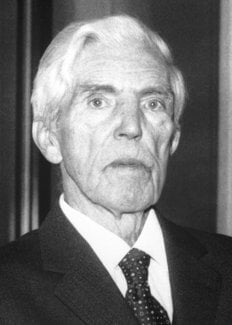Trygve Haavelmo
Biographical

The field of econometrics is concerned with estimating economic relations and testing whether postulated relations conform fully with reality. In an article in Econometrica in 1943 and in his doctoral thesis entitled, The Probability Approach in Econometrics (1944), Haavelmo showed that the results of many of the methods used thus far had been misleading. Earlier methods did not sufficiently account for the fact that real economic development is determined by interaction of a multitude of economic relations and that economic laws are not strictly rigorous.
In his thesis, Haavelmo presented a new and pathbreaking approach to the estimation of economic relations by applying methods used in mathematical statistics. His work established the foundations for a new field of research which came to dominate the study of estimating complex economic relations.
In his review of Haavelmo’s doctoral thesis, the British Nobel laureate Richard Stone wrote that it was a brilliant contribution to econometrics which would have a revolutionary effect on the degree of success in estimating economic relations.
After he became professor at the University of Oslo, Haavelmo’s research interests turned to economic theory. His book, entitled, A Study in the Theory of Economic Evolution (1954), was a pioneering study of the possible reasons for economic underdevelopment of a country in relation to other countries, long before other economists became seriously engaged in development research.
Haavelmo also made a valuable contribution to the theory which determines the development of investments in a country. His book, entitled, A Study in the Theory of Investment (1960), introduced theories on the demand for real capital, and sluggishness in the adjustment of real capital, which have been of fundamental importance in subsequent research. Numerous theoretical and empirical studies of investment behavior have been inspired by his work.
Many of Haavelmo’s other studies, such as a monograph on environmental economics which appeared long before such research came into existence, have been an inspiration to other researchers.
Haavelmo has had a decisive influence on economics in Norway – not only as a researcher, but also as a teacher. During his active years at the Institute of Economics at the University of Oslo, he was the leading teacher in the field. He covered numerous areas of economic theory and many of his students and assistants received their first instruction in authorship by writing expositions based on his lectures – under stimulating guidance. No less inspiration was given to the many research recruits for whom Haavelmo served as advisor.
This autobiography/biography was written at the time of the award and later published in the book series Les Prix Nobel/ Nobel Lectures/The Nobel Prizes. The information is sometimes updated with an addendum submitted by the Laureate.
Trygve Haavelmo died on July 26, 1999.
